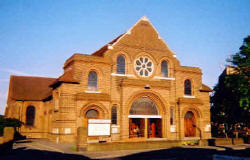|
By 1906, it was becoming clear that a
larger building was needed for Sunday worship. A new building fund
was started. During the summer of 1907, work commenced on a new
Church made of corrugate iron. This ‘tin tabernacle’ (as many
similar structures were known) could accommodate 350 people. It
opened for worship on 23rd July 1908.
After six years, the Church’s
membership had increased, having received 97 members following believers’
baptism and 212 members by transfer from other churches. There were
190 children in the Sunday School. History does not record the
difficulties which must have been experienced in hearing the preacher if
ever there was a downpour during a Sunday service – one can only imagine
the noise on such an iron roof!
The ministry of Percy Clements
continued until 1914, when he accepted a call to the pastorate of Herne
Hill Baptist Church. His leadership was greatly appreciated by the
Church and was influential for many years to come. Writing in 1951,
at the time of the Church’s 50th anniversary, EW Warner wrote:
“The
active and devoted service of this young minister made a lasting
impression on the Church. It became a centre of evangelistic zeal.”
It is certainly true that by 1915, the
Sunday School at Pier Avenue was the fourth largest of all the Baptist
Churches in Essex, with 308 members – just one indication of the Church’s
commitment to sharing the Christian Gospel with young people.
The First World War brought a period
of great stress for Clacton and its churches. Rev AE Calver accepted
the call to the pastorate, and began his ministry in November 1915.
The Church continued its witness in the town, and was able to offer
encouragement and spiritual care to the members of the armed forces who
were stationed in the area, as well as to the local population.
At the Church’s Annual General Meeting
in 1920, Mr Calver was able to announce that for the first time, the
Church was completely free of all debts.
After a six-year ministry in Clacton,
Mr Calver left the area to minister at Emsworth Baptist Church, near
Portsmouth.
He was succeeded, in January 1922, by
Rev Daniel Hayes, who came to Clacton following a ministry at Shoreditch
Tabernacle in London.
back to top
Over the next few years, a number of
new initiatives were begun. A Manse was purchased for the first
time, to be used as a home by the Minister and his family – previous
ministers had lived in rented accommodation. An envelope system was
introduced for Sunday offerings, to ensure a more stable flow of income (a
similar system is still in use today, as an encouragement to worshippers
to give, even when they are unable to be at Church).
Soon, the Church launched another
‘Building Fund’, so that the ‘Iron Church’ could be replaced with a
permanent structure. By 1928, work on the new building had begun,
and it was completed the following year
at a cost of £8,643 – equivalent to £250,000 today.
The official opening of the third (and
present) Church building was held on 12th June 1929. Dame
Margaret Lloyd George, the guest of honour, performed the opening
ceremony. It was proposed that the new Church would seat 850 –
although a balcony was never added, reducing capacity to approximately
600.
The Rose window at the south end of
the Church is named after Rev Hayes, whose energy and enthusiasm were
largely responsible for the scheme being completed. He retired from
the pastorate in 1931 because of ill health, and sadly died the following
year.
The new Church was not without its
problems. It was soon discovered that the acoustics were very poor.
Special acoustic tiles had to be fitted throughout.
- Telephone the Church Office: 01255 474391 or
email us
|

![]()
![]()
